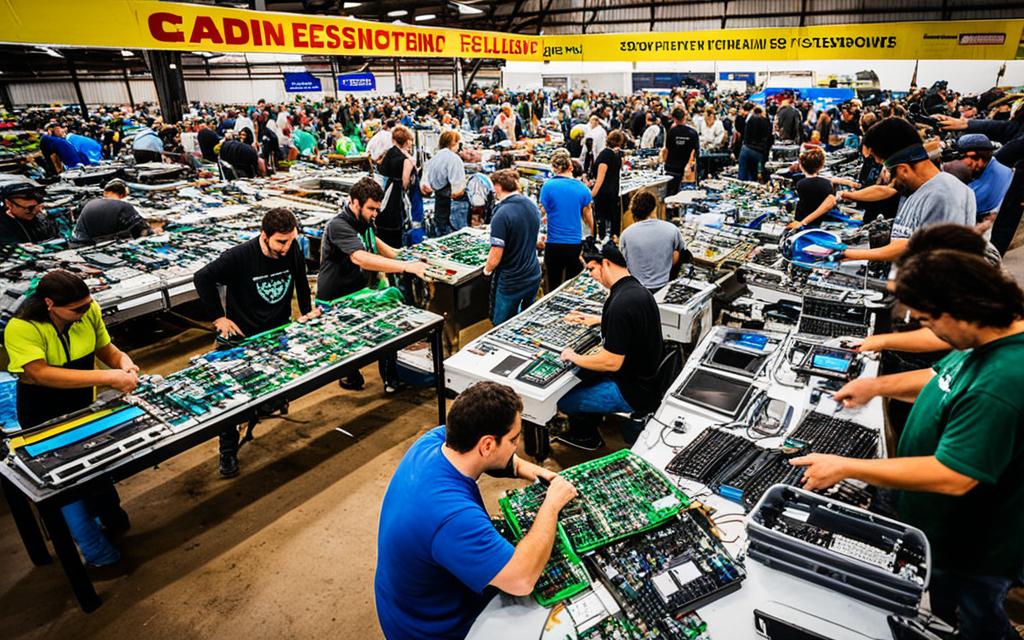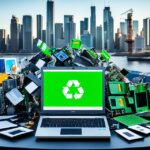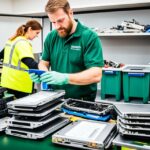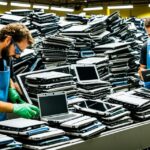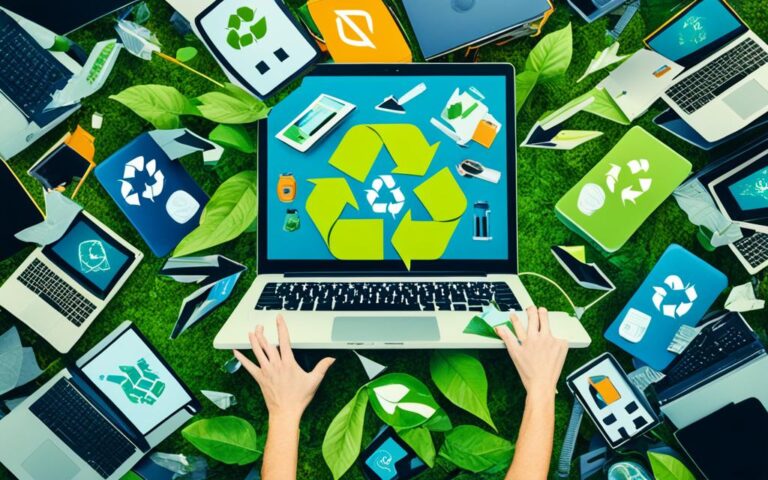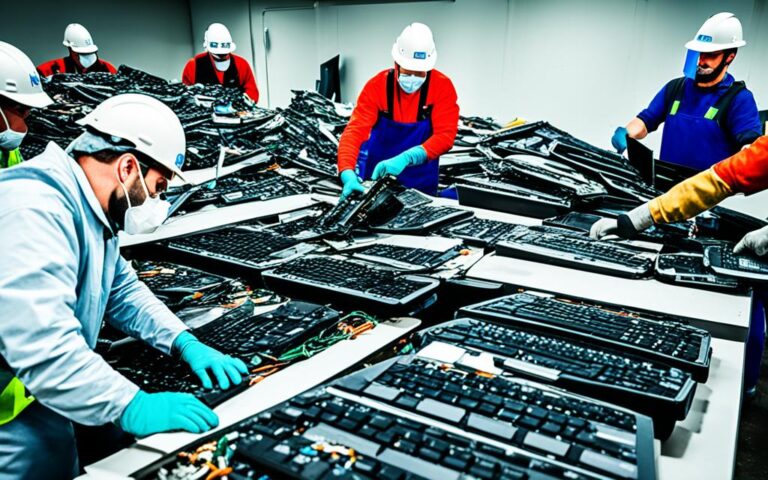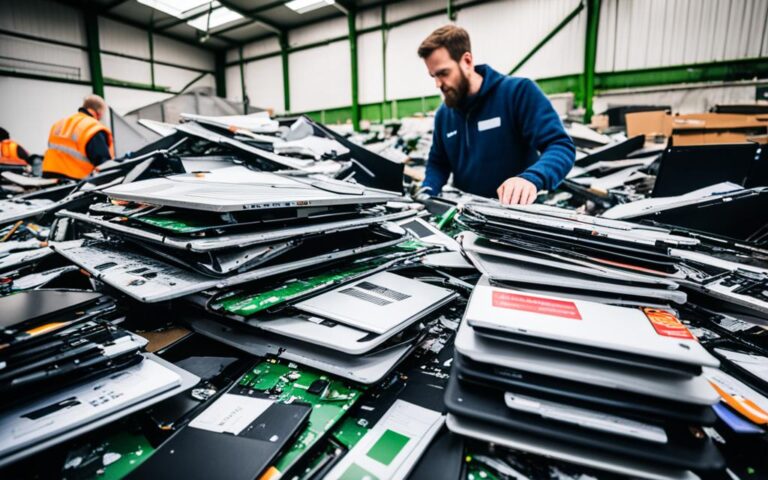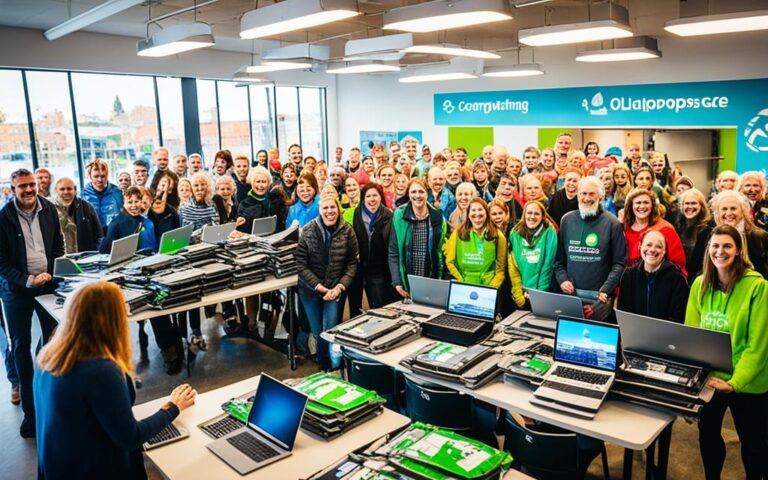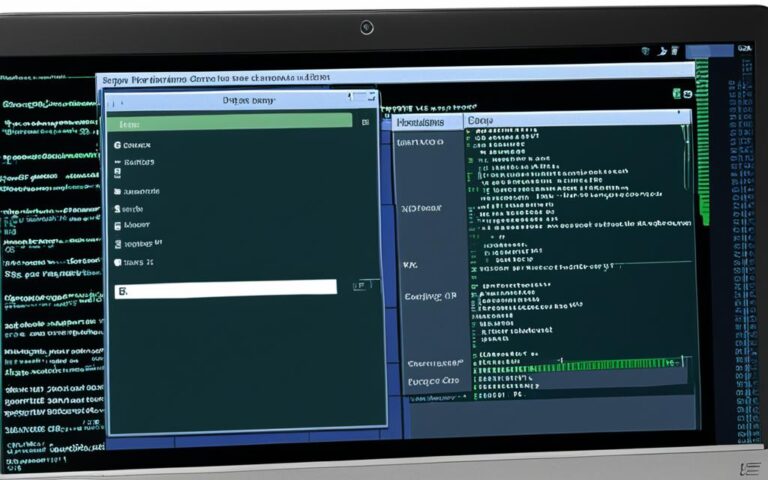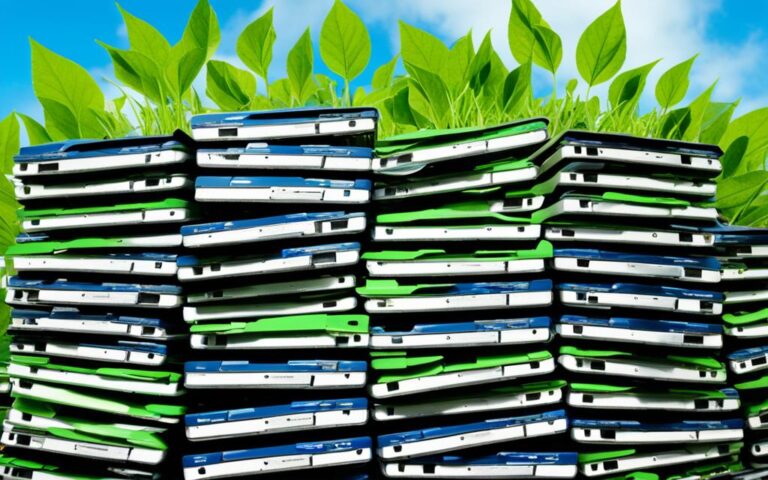Exploring the Market for Recycled Laptop Components
Laptop recycling is becoming increasingly popular as a way to reduce our carbon footprint and benefit the environment. In London, a leading city in Europe for laptop recycling, various organizations offer recycling services to promote sustainability. Recycling laptops not only prevents hazardous materials from contaminating the environment but also reduces our reliance on natural resources.
Recycling laptops helps to:
- Reduce environmental contamination
- Save money
- Promote a more sustainable future
By actively participating in laptop recycling, we can contribute to a cleaner planet and pave the way for a greener future. Let’s dive deeper into the importance of laptop recycling and discover how it benefits us all.
Why Laptop Recycling is Important
Laptop recycling plays a crucial role in reducing hazardous materials, minimizing reliance on natural resources, and saving money. By recycling laptops, we can significantly contribute to a more sustainable future while protecting the environment from the harmful effects of electronic waste.
One of the primary reasons why laptop recycling is important is because it helps prevent hazardous materials from ending up in landfill sites. Laptops contain various toxic substances, including lead, mercury, and cadmium, which can seep into the soil and water, causing pollution and harming ecosystems. By recycling laptops, we reduce the risk of these hazardous materials contaminating our environment and posing a threat to human health.
Furthermore, recycling laptops enables us to reduce our reliance on natural resources. The process of manufacturing new laptops requires significant amounts of raw materials, including metals, plastics, and rare earth elements. By reusing materials from recycled laptops, we can conserve these valuable resources and minimize the need for extraction, thereby reducing the environmental impact associated with mining and refining operations.
Not only does laptop recycling benefit the environment, but it also offers financial advantages. Recycling laptops allows for the recovery of valuable components and materials, such as copper, gold, and aluminum, which can be reused or sold. Some recyclers even offer cash payments for old laptops, providing an incentive for individuals and businesses to recycle their devices. Additionally, recycling laptops helps save money on energy costs since the process of extracting and refining raw materials requires significant amounts of energy.
By embracing laptop recycling, we can make a meaningful difference in reducing electronic waste, protecting our planet, and conserving valuable resources. Whether you’re an individual or a business, recycling your old laptops is a simple yet impactful way to contribute to a more sustainable future.
“Recycling one million laptops saves the energy equivalent to the electricity used by more than 3,500 homes in a year.” – Environmental Protection Agency
The Environmental Benefits of Laptop Recycling
“Laptop recycling is not just about electronic waste management; it is a conscious effort to reduce our ecological footprint and create a greener, more sustainable world.” – GreenTech Recyclers
How to Recycle Your Old Laptops in London
When it comes to recycling old laptops in London, there are several options available. Whether you prefer to turn to local councils or dedicated recycling companies, responsible laptop disposal is within your reach. However, it is crucial to conduct thorough research to find a certified recycler that complies with the standards set by relevant authorities. By choosing a certified recycler, you can ensure that your old laptop will undergo responsible disposal to minimize its environmental impact and promote sustainability.
In London, several organizations specialize in laptop recycling and offer services to facilitate the responsible disposal of old laptops. These organizations employ proper recycling techniques to ensure that valuable materials are recovered while minimizing the potential harm to the environment.
Organizations for Laptop Recycling in London
- London Waste and Recycling Board (LWARB)
- West London Waste Authority (WLWA)
- East London Waste Authority (ELWA)
- North London Waste Authority (NLWA)
These organizations work closely with local councils and communities to create a sustainable and efficient laptop recycling system. They have established partnerships with certified recyclers, ensuring that old laptops are handled responsibly and in an environmentally friendly manner.
Responsible Disposal Process
The responsible disposal of old laptops involves several steps to ensure that the recycling process is carried out effectively and safely. Below is an overview of the responsible disposal process:
- Collection: Old laptops are collected from individuals, households, and businesses by local councils or authorized recycling companies.
- Sorting: The collected laptops are sorted based on their condition and potential for reuse.
- Data Wiping: In the case of laptops suitable for reuse, data wiping is performed to protect your personal information.
- Recycling: Laptops that are not suitable for reuse undergo a recycling process where materials such as plastics, metals, and circuitry are separated and recovered.
- Disposal: Hazardous materials, such as batteries, are disposed of in accordance with regulations to prevent environmental contamination.
By following this responsible disposal process, certified recyclers ensure that old laptops are recycled efficiently and in line with environmental standards.
Choosing the Right Certified Recycler
When recycling your old laptop, it is crucial to select a certified recycler that adheres to the highest industry standards. Look for certifications such as the Waste Electrical and Electronic Equipment (WEEE) compliance certificate and ISO 14001 certification, which demonstrate a commitment to responsible recycling practices.
By choosing a certified recycler, you can also contribute to a more sustainable future by supporting organizations dedicated to minimizing electronic waste and promoting the circular economy.
| Benefits of Choosing a Certified Recycler |
|---|
| Environmental protection through responsible disposal |
| Efficient recovery of valuable materials |
| Contribution to a sustainable and circular economy |
| Compliance with industry standards and regulations |
The Growing Market for Post-consumer Recycled Plastics in Consumer Electronics
The market for post-consumer recycled plastics in consumer electronics is experiencing rapid growth, driven by technological advancements and the increasing emphasis on sustainability. As the demand for electronic devices continues to rise, so does the need for sustainable materials that reduce environmental impact and promote a circular economy.
Advancements in recycling technologies have played a significant role in improving the quality of post-consumer recycled plastics, making them suitable for electronic applications. These technologies include innovative sorting and processing techniques that refine the plastics to meet industry standards and enhance their properties.
Material science innovations have also contributed to the development of recycled plastics with enhanced characteristics, such as increased durability and heat resistance. This has propelled the adoption of recycled plastics in the manufacturing of consumer electronics, as they can now meet the performance requirements of electronic devices.
Technological advancements have enabled the integration of recycled plastics in consumer electronics, promoting a circular and environmentally conscious model. Circular design principles, traceability technologies, and industry-wide standards further contribute to the market’s growth.
The circular economy approach emphasizes the importance of designing products and processes that enable the reuse and recycling of materials, thereby reducing waste and conserving resources. Recycled plastics play a vital role in this model by providing a sustainable alternative to virgin plastics, which require significant amounts of energy and natural resources to produce.
Furthermore, traceability technologies have been implemented to ensure that post-consumer recycled plastics used in consumer electronics comply with industry standards and regulations. This not only assures the quality and safety of the products but also increases transparency and accountability throughout the supply chain.
The growing market for post-consumer recycled plastics in consumer electronics is a testament to the industry’s commitment to sustainability and the circular economy. By embracing technological advancements and leveraging sustainable materials, manufacturers can meet the increasing demand for electronic devices while minimizing their environmental impact.
Advancements in Post-consumer Recycled Plastics
| Advancement | Description |
|---|---|
| Improved Recycling Technologies | Innovative sorting and processing techniques enhance the quality and properties of recycled plastics for electronic applications. |
| Material Science Innovations | Development of recycled plastics with enhanced characteristics, such as durability and heat resistance. |
| Circular Design Principles | Emphasis on designing products for reuse and recycling, promoting a circular economy. |
| Traceability Technologies | Implementation of systems to track and verify the origin and quality of post-consumer recycled plastics. |
| Industry-wide Standards | Establishment of regulations and guidelines to ensure the compliance and safety of recycled plastic materials. |
With continued technological advancements and increased awareness of the benefits of sustainable materials, the market for post-consumer recycled plastics in consumer electronics is poised for further growth. By embracing circular design principles and leveraging innovative recycling technologies, manufacturers can contribute to a more sustainable future while meeting consumer demands for environmentally friendly electronic devices.
Recycling Process for Laptop Components
Laptop components can be recycled through various processes. When it comes to recycling laptop keys and chassis, they are typically shredded and sold as mixed plastic scrap. This allows for the plastic material to be reused in other applications, reducing waste and conserving resources.
Printed Circuit Boards (PCBs), processors, and memory modules found in laptops also contain recyclable materials. In addition to plastics, these components often contain fiberglass and precious metals such as gold, silver, and palladium. By recycling these valuable resources, we can reduce the need for mining and minimize the environmental impact associated with extracting new materials.
Batteries, another essential component of laptops, undergo a manual evaluation process for potential reuse before being recycled. This evaluation helps identify batteries that can still serve a purpose, extending their lifespan and reducing the overall environmental impact of laptop recycling.
Other components made of plastics and metals, such as drives, fans, cables, and connectors, can be separated and recycled. Through proper sorting and processing, these materials can be repurposed in the manufacturing of new products, contributing to the circular economy and reducing the strain on natural resources.
Furthermore, LCD screens found in laptops can also be recycled. The recycling process involves separating the glass substrates and polarizer foils from the screen. Additionally, valuable materials such as indium and copper can be extracted from the screen, further reducing the need for raw materials and minimizing waste.
To summarize, laptop recycling involves the separation and processing of various components, including plastics, precious metals, and other recyclable materials. By recycling these components, we not only conserve resources and reduce waste but also contribute to a more sustainable future.
Dell’s Efforts in Recycling Laptop Components
Dell, a leading technology company, is committed to sustainability and has implemented various recycling programs to prioritize the reuse and responsible recycling of laptop components. By participating in Dell’s recycling programs, individuals and businesses can contribute to reducing electronic waste and promoting a more sustainable approach to laptop recycling.
Dell Reconnect Partnership with Goodwill
One of Dell’s notable initiatives is its partnership with Goodwill through the Dell Reconnect program. This program allows consumers to recycle any brand of computer at participating Goodwill locations across the United Kingdom. Through this partnership, Dell aims to increase the accessibility and convenience of laptop recycling, making it easier for people to responsibly dispose of their old computers and components.
The plastics recovered through the Dell Reconnect partnership with Goodwill are recycled back into new parts, reducing the need for virgin plastic production. This closed-loop approach helps to minimize waste, conserve resources, and contribute to a more circular economy.
Waste-Free Packaging
In addition to its recycling programs, Dell also focuses on waste reduction through its waste-free packaging initiatives. Dell recognizes the importance of using environmentally friendly materials and has taken steps to incorporate recyclable materials into its packaging process.
Dell utilizes recyclable materials such as corrugated cardboard and recovered ocean plastics in its packaging. By using these sustainable materials, Dell aims to minimize the environmental impact of packaging waste and promote the principles of a circular economy.
Furthermore, Dell’s commitment to waste reduction extends beyond its own operations. The company actively collaborates with suppliers and partners to encourage the adoption of sustainable packaging practices throughout the industry.
Dell’s Recycling Initiatives
| Initiative | Description |
|---|---|
| Dell Reconnect Partnership with Goodwill | Allows consumers to recycle any brand of computer at participating Goodwill locations |
| Plastic Recycling | Recycles plastics recovered through recycling programs back into new parts |
| Waste-Free Packaging | Utilizes recyclable materials like corrugated cardboard and recovered ocean plastics in packaging |
Through its recycling programs and waste reduction efforts, Dell continues to make significant strides in promoting a more sustainable and environmentally conscious approach to laptop recycling. By partnering with organizations like Goodwill and embracing waste-free packaging, Dell sets an example for other companies in the industry and encourages individuals to participate in responsible e-waste disposal.
Conclusion
Laptop recycling plays a crucial role in reducing our environmental impact and promoting sustainability. With advancing technology, it is now possible to recycle laptop components and create sustainable materials, contributing towards a circular economy. One brand that stands out in its commitment to sustainability is Dell.
Dell has implemented various recycling programs and initiatives to encourage the responsible disposal and reuse of laptop components. Their partnership with Goodwill through the Dell Reconnect program allows consumers to recycle any brand of computer, ensuring that valuable materials are recovered and recycled back into new parts.
By recycling laptops and supporting companies like Dell, individuals and businesses can actively contribute to a more sustainable future. It is important to recognize the importance of laptop recycling in conserving resources and minimizing electronic waste. Let us embrace the advancements in technology and join hands with brands like Dell in their mission towards a greener and more sustainable world.
FAQ
Why is laptop recycling gaining popularity?
Laptop recycling is gaining popularity as a way to reduce our carbon footprint and positively impact the environment.
What are the benefits of laptop recycling?
Laptop recycling prevents hazardous materials from contaminating the environment, reduces reliance on natural resources, saves money, and promotes a more sustainable future.
Why is laptop recycling important?
Laptop recycling prevents hazardous materials from ending up in landfill sites, reducing environmental contamination. It also helps reduce our reliance on natural resources by reusing materials from recycled laptops.
What options are available for recycling old laptops in London?
There are several options for recycling old laptops in London. Local councils and dedicated recycling companies provide services for responsible laptop disposal. It is important to research and choose a certified recycler that meets the relevant authorities’ standards.
What is the market trend for post-consumer recycled plastics in consumer electronics?
The market for post-consumer recycled plastics in consumer electronics is growing rapidly. Technological advancements have enabled the integration of recycled plastics in electronic devices, promoting a circular and environmentally conscious model.
How can laptop components be recycled?
Laptop components can be recycled through various processes. Plastics from laptop keys and chassis can be shredded and sold as mixed plastic scrap. Printed Circuit Boards (PCBs), processors, and memory contain plastics, fiberglass, and precious metals that can be recycled.
What recycling programs has Dell implemented for laptop components?
Dell has implemented recycling programs to prioritize reuse and responsible recycling of laptop components. Through the Dell Reconnect partnership with Goodwill, consumers can recycle any brand of computer at participating locations.
Why is laptop recycling important for promoting a circular economy?
Laptop recycling is important for reducing environmental impact, conserving resources, and promoting a circular economy. Advancements in technology have enabled the recycling of laptop components and the production of sustainable materials.

